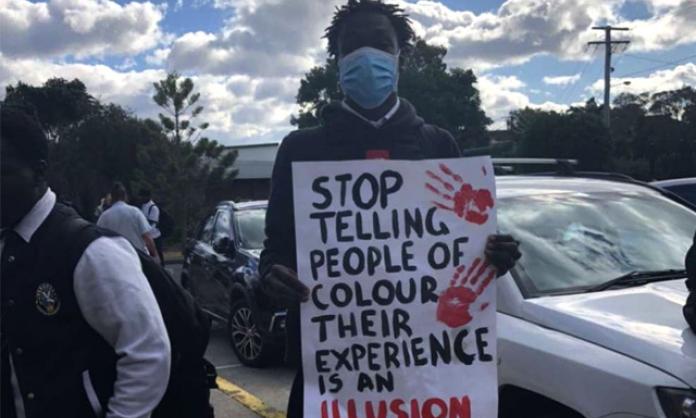Students at Yeronga State High in Brisbane’s south have complained that racism, especially the use of slurs and unfair discipline, is too common at their school. So, inspired by the Black Lives Matter movement, they have spoken up and fought back.
More than half of the students at Yeronga come from migrant and refugee backgrounds. And the school has a progressive reputation. In 2015, teachers made history by going on strike to fight the attempted deportation of an Iranian refugee student, Mojgan Shamsalipoor.
“The school sort of represents itself, and the principal represents it, as a safe space for all identities—Muslims, Blacks—but it’s sort of not”, Abu Jamal, a 15-year-old who describes himself as a Black Muslim, tells Red Flag. “While I was in the school, I had two racist incidents happen to me. I was called the n-word, and things such as that. And I didn’t feel that it was safe to go and talk to the teachers, because the school doesn’t provide that to the students. And there are many others who have expressed the same.”
On 10 August, year 12 students put a poster on Instagram and Snapchat that read: “No Justice, No Peace! YSHS students wear all black, no assembly, no class until justice is served”. The following day, 70-80 students gathered in the school courtyard, chanting, “Black lives matter!” and “No justice, no peace!”
“I think the thing that inspired everyone was seeing photos and screenshots of the school captain saying the n-word”, Abu says. “And basically ... the injustices that are happening all over the world—systematic racism, and things such as that.”
The students brought a megaphone to give speeches. Many brought homemade placards, some reading, “Stop telling people of colour their experience is an illusion” and “Tolerating racism is racism”.
One of the school captains was a white student who used the n-word in a social media post. Initially, he did not face discipline from the school. But the second school captain, a Black woman, was threatened with suspension for wearing a hoodie instead of the school uniform to the protest.
After four hours on strike, the students were told they could go home. The following day, the principal was forced to apologise at the school assembly. The school captain—who had apparently been hiding inside a classroom during the protest—was suspended for one week. The school has appointed representatives from the group of protesters to speak to the administration. But Abu says it is not enough:
“While it was very empowering to see how many people are supporting you and supporting the same cause, the school captain is still there, the principal is still there. I don’t think it’s achieved its goal, but it was very empowering to see all the people that were on our side, helping us. Just last week, in engineering class, there was a teacher calling a student of African descent, whose English was sort of not good, who was behind the class. And the teacher called him a fuckwit in front of everyone—he looked very sad, he looked almost depressed.”
Yet the students have grown more confident to speak up. “Personally, I am extremely supportive of the Black Lives Matter movement, and I think a lot of the people in my school do”, Abu says. “Seeing George Floyd and Breonna Taylor and Ahmaud Arbery, all those protesters being brought to life, and these mass protests happening all over the world—it inspired everyone.”








